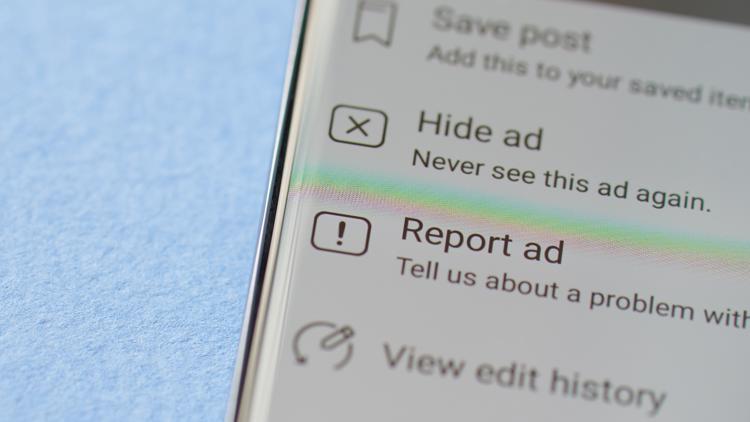Each holiday season, scammers hope to turn consumers’ Christmas shopping into gifts for themselves.
People under the age of 70 fall for social media scams more often than any other type of scam, such as phone calls, texting and email, according to Federal Trade Commission (FTC) data.
There are many types of social media scams and many different methods scammers use to trick victims. We VERIFIED six different ways scammers use social media to target victims and teach you how to avoid these scams.
THE SOURCES
- Federal Trade Commission (FTC)
- Massachusetts Office of Consumer Affairs and Business Regulation
- Terranova Security, a cybersecurity company
- Wells Fargo
- Competition and Consumer Protection Commission (CCPC), an Irish consumer protection agency
- Aura, a cybersecurity company
Online shopping scams
The most common social media scams are ads, particularly on Facebook and Instagram, that lead to fake online stores that never deliver items their victims have purchased, according to the FTC.
A red flag that an online store’s website may be fraudulent is if it’s missing basic information, such as shipping times, costs, address and direct contact information, the Massachusetts Office of Consumer Affairs says.
If you’re unsure about an online store, you can check for consumer reviews or scam reports on the Better Business Bureau’s website. A store can fake the reviews on its own website, so it’s best to look at information posted on other sites. The FTC recommends simply searching for a store’s name and “scam” or “complaint” on Google before buying items.
Using a credit card instead of a debit card for online purchases can also give you more protection against fake stores, the Massachusetts Office of Consumer Affairs says. That’s because credit cards “offer better fraud protection and provide a safer way to dispute unauthorized charges if necessary.”
Most people who use social media marketplaces, such as Facebook Marketplace, are genuine people selling legitimate items, but scammers may also pose as sellers or customers, the Competition and Consumer Protection Commission (CCPC) says.
The CCPC recommends that buyers not hand over any money unless they’re sure the item is legitimate. It advises sellers not to click any link a buyer sends them and to not send the buyer any details that might allow them to gain access to their bank account.
Impersonators of family and friends
This scam begins when the scammer either hacks a person’s profile or creates a brand new, fake profile meant to look like someone else’s.
Then, the scammer will usually directly message family and friends of the person they’re impersonating, claim there’s an emergency and ask for money, says Terranova Security, a cybersecurity company.
Alternatively, the scammer may send their victims links to malicious websites instead of asking for money, according to Wells Fargo.
Whether it’s a request for money or an unexpected link, you should double-check the identity of the sender, say Terranova Security and Wells Fargo. Do that by contacting the person through other means, such as a call, text or email. Only take action after they’ve confirmed the message is really from them.
You should generally be suspicious of profiles that are brand new or if you receive a friend request from a profile you thought you were already friends with, the Massachusetts Office of Consumer Affairs says.
Other fake lookalike accounts
In some cases, scammers will create profiles impersonating a well-known company, a government agency or a popular celebrity by using their names, logos and photos.
These types of imposter accounts may post malicious links disguised as fake giveaways, promote investment scams or request money through direct messages, according to Aura, a cybersecurity company.
Fake giveaways are used to harvest user data, steal personal information or spread malware. Terranova says genuine giveaways won’t ask for sensitive information and will always be conducted through a company’s official channels.
These imposter accounts are usually new profiles. Their posts, messages and account information will often have poor grammar and spelling, the Massachusetts Office of Consumer Affairs says. These accounts will also lack the official verification given to companies on most social media websites.
Aura notes that scammers may also pose as celebrities and directly contact people to ask for money or claim they’re raising money for charities. Neither Taylor Swift nor any other celebrity will ever directly message random fans to ask for money.
Phony money-making opportunities
For some schemes, scammers don’t need to impersonate someone you already know. They can lure in victims by posting publicly about fake investment or job opportunities.
Victims reported losing more money to investment scams than any other kind of social media scam in the first half of 2023, according to the FTC.
Social media investment scams, which are often based around cryptocurrency, often promote the scammer’s own supposed success to lure people to investment websites or apps that turn out to be phony and leave victims empty-handed after they invest, the FTC said.
Job offer scammers will usually promise their victims a good job, sometimes in the form of attractive work-from-home opportunities, but then require some kind of fee to actually secure the phony position, Wells Fargo and Terranova say.
Legitimate employers, both online and off, will never ask you for a payment as a condition for employment, Terranova Security says.
And you should generally be suspicious of anyone on social media who is asking for money or offering you money, Wells Fargo says.
Romance scams
Romance scams often start with a seemingly innocent friend request from a stranger, quickly followed by love bombing and eventually requests for money, according to the FTC. These scams often start on Facebook, Instagram or Snapchat.
These kinds of scammers tend to profess their “love” for you unusually quickly and may even offer to move closer to you, Wells Fargo says. Treat any quick profession of love from an online stranger as a red flag, Terranova says.
Wells Fargo says other common signs of this scam include poor or vague communication, flowery language and a small number of pictures and posts on the stranger’s account.
You should avoid sending money to anyone you have only met online, Wells Fargo says.
Malicious surveys and quizzes
Personality quizzes and surveys are popular on social media, and are thus popular among scammers, too. These malicious quizzes might ask for permissions that give them access to your account or ask for personal details that can be used to steal your identity or financial information.
“When you encounter a quiz or social media test that asks for unnecessary personal details or permissions, do not proceed,” Terranova Security says.
Keeping yourself from being scammed
There is no 100% foolproof way to avoid being targeted by scammers on social media, but there are ways to reduce the likelihood.
Wells Fargo recommends setting your profiles to be private, so only people you know can see your information and posts. You should also restrict your contacts to people you know personally. Don’t accept random friend requests from strangers.
If you can turn off messages from strangers or filter them, it’s a good idea to do that, too.
The Massachusetts Office of Consumer Affairs recommends that you regularly review your accounts’ privacy settings so you can ensure your information is only visible to people you know and trust. It also recommends regularly changing your password and using two-factor authentication for logins.



